Fujinon F1.6 4.1-9mm Varifocal CCTV Lens-Design
Fujinon F1.6 4.1-9mm Varifocal CCTV Lens – Released in May 2014, Fujinon’s varifocal F1.6 4.1-9mm (2.2x) megapixel lens is designed to support sensors up to 1/1.8 and resolutions of 6MP. The CS-mount lens supports near infrared wavelengths and offers horizontal angles of view between 100 and 45 degrees. In this feature we’re going to test the lens a couple of different cameras to see how it does.
Fujinon F1.6 4.1-9mm Varifocal CCTV Lens-Specifications
When it was released, Fujinon’s FUJINON DV2.2×4.1SR4A 4.1-9mm lens was claimed to be the first varifocal lens able to support 6MP resolutions. This lens has a maximum aperture of F1.6 – T360, a hyperfocal distance at 4.1mm of 300mm, dimensions of 65.2 x 66.6mm and a weight of 135g. When compared to Fujinon’s 15-50mm AT lens, the DV2 is more lightly built and has a different lens coating on the front element – it looks like Magnesium Fluoride in the 550nm range.
The aspherical varifocal auto iris Fujinon 4.1-9mm f1.6 is a little slower than many kit lenses and along with that 6MP resolution, it offers an ND filter for high sensitivity cameras and has the equivalent of 2.2x optical zoom in a manual form factor.
Fujinon F1.6 4.1-9mm Varifocal CCTV Lens-Its Features and Performances
Fujinon F1.6 4.1-9mm Varifocal CCTV Lens – The body is plastic and the internals feel like plastic, too. This said, the lens has nice enough finger-feel when focusing. The DV2 carries most it’s maximum diameter all the way to the lens head giving it a comparatively bulky look that is belied by its light weight. It’s quite easy to tweak zoom and focus with a 4.1-9mm varifocal lens and it takes practically no time for me to settle on a focal length of around 5.5mm out the front and I wind in to 9mm when I move the camera into the lane.
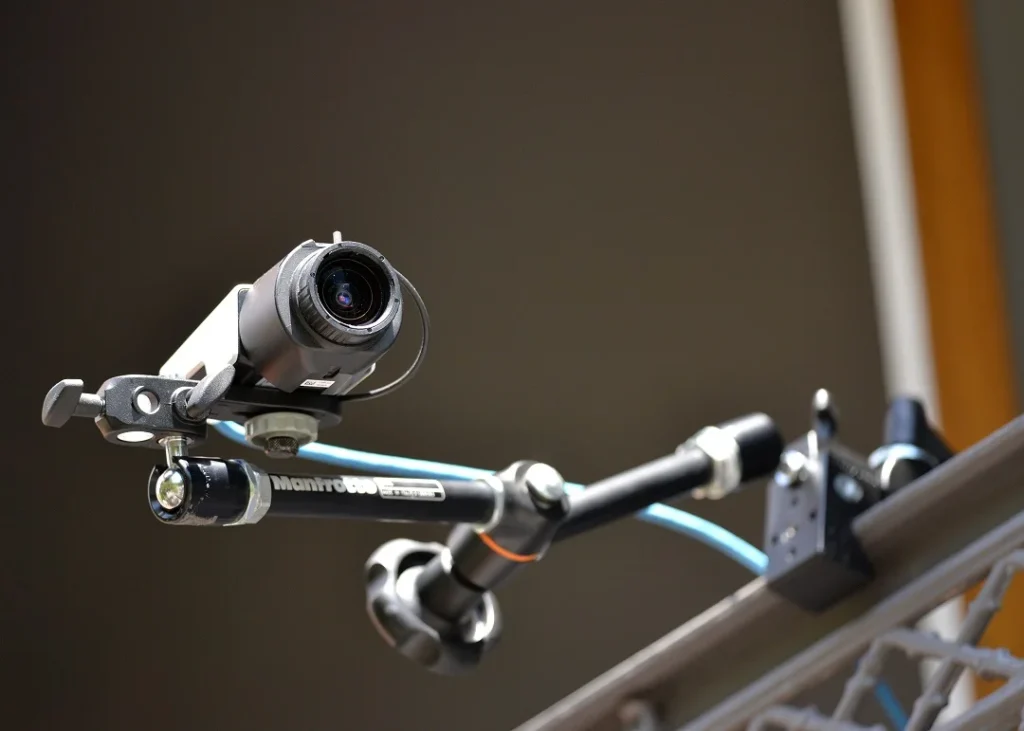
Fujinon F1.6 4.1-9mm Varifocal CCTV Lens – For the first part of this test we’re going to take a look at the performance of the DV2 on a camera we’re all very familiar with, the full body 1080p Axis M1125 with a progressive scan ½.8-inch CMOS with a maximum resolution of 1080p HD (1920 x 1080) and a frame rate of 25fps in H.264 and MJPEG. Zipstream is available in H.264 and I run with it on the lowest setting the whole test. As mentioned, an important number is WDR, which is 120dB.
Minimum scene illumination is claimed to be 0.25 lux in colour and 0.05 lux in monochrome. This is a camera that does very well in low light and has low latency as light levels fall, allowing easy faces and license plates. Performance of the M1125 is pretty good and it’s enhanced by a higher quality lens, as we saw in our Fujinon 15-50mm test last year.
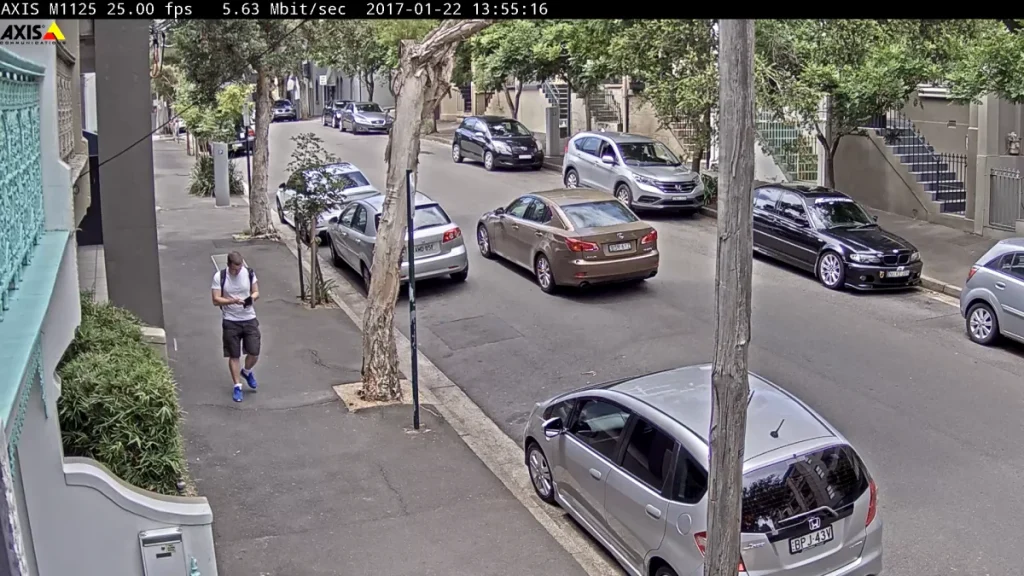
Fujinon F1.6 4.1-9mm Varifocal CCTV Lens-Its Colour Rendition
Fujinon F1.6 4.1-9mm Varifocal CCTV Lens – Fixing the Fujinon F1.6 4.1-9mm Varifocal CCTV Lens to the front of the SEN office at a focal length of around 5.5mm the first things to notice are the strong contrast and sharpness and the quality of the colour rendition. I have the camera set to default. There’s considerable backlight in this image and while there’s no ghosting or blooming evident as a result of it, I can see the purple fringing of mild chromatic aberrations.
This is something we never saw with the 15-50mm lens and suggests less consistent tolerances with DV2. Regardless, performance is considerable better than it was with the Axis Ricom lens which ships standard with the M1125. The CAs melt as the afternoon wears on. As the sun slides to the south west they disappear altogether.
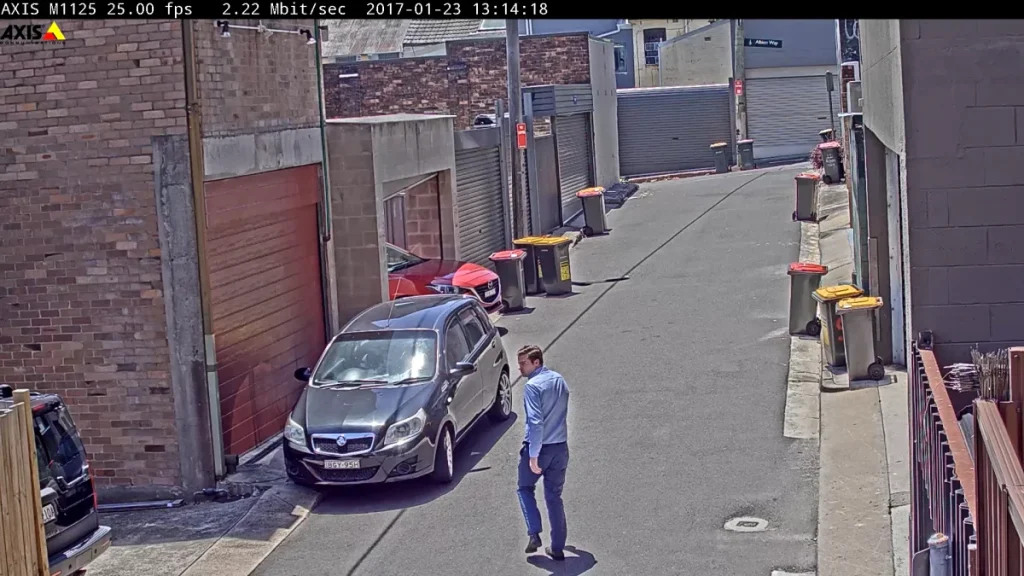
At 5.5mm on a 4.1-9mm lens you are approaching the sweet spot when it comes to distortion but the DV2 is already very good with distortion at the wide end. I can see almost no distortion whatever around the edges of the image out here. It’s true that you can depend on the centre of a wide-angle lens where the distortions are least impactful on sharpness but it’s better to have a lens without distortion in the first place. When it comes to overall sharpness with the DV2, face recognition of pedestrians is where the lens really shines.
There’s no doubt some benefit to be had from the 1080p resolution of the Axis camera, which unloads the processor when compared to higher resolution offerings. It’s a combination that means low motion blur and high levels of detail.
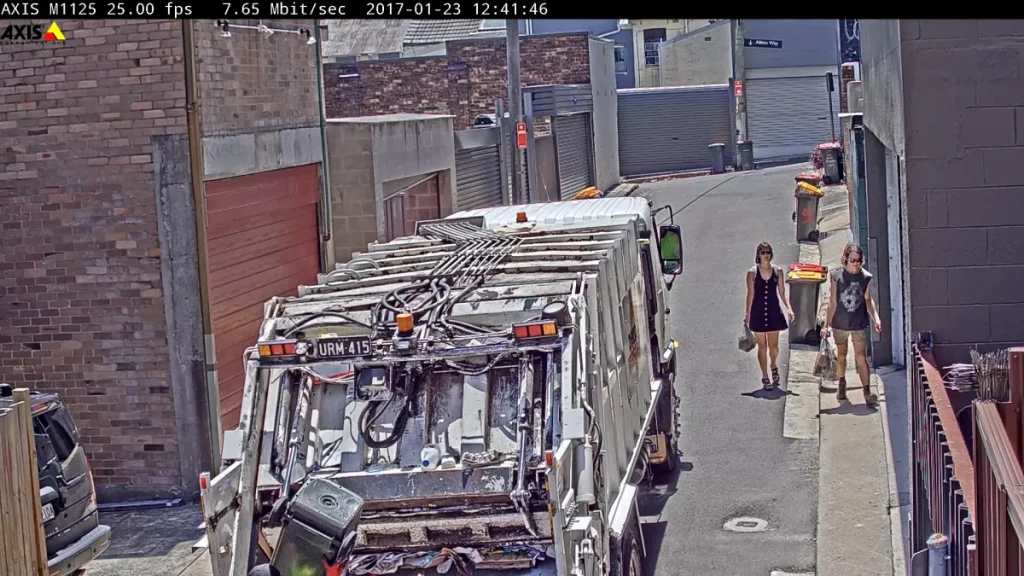
Fujinon F1.6 4.1-9mm Varifocal CCTV Lens-WDR Test
When faced with extremes of backlight in our WDR test, the DV2 also outshines the Ricom kit lens – by a very wide margin, especially at 9mm. When a car zooms up the lane at 30kmph I get an easy plate and notice the high detail and low noise characteristics of this combo. Long focal lengths are lovely things – even mid-focal lengths like this one. Resolution, sharpness, contrast, distortion control are all at maximum levels.
It’s not quite as sparkling as the performance of this camera with the 15-50 fitted but it’s extremely good and I can’t help wondering how the little Axis would have fared at Scentre Group’s CCTV Camera Shootout with this 4.1-9mm lens attached to it.
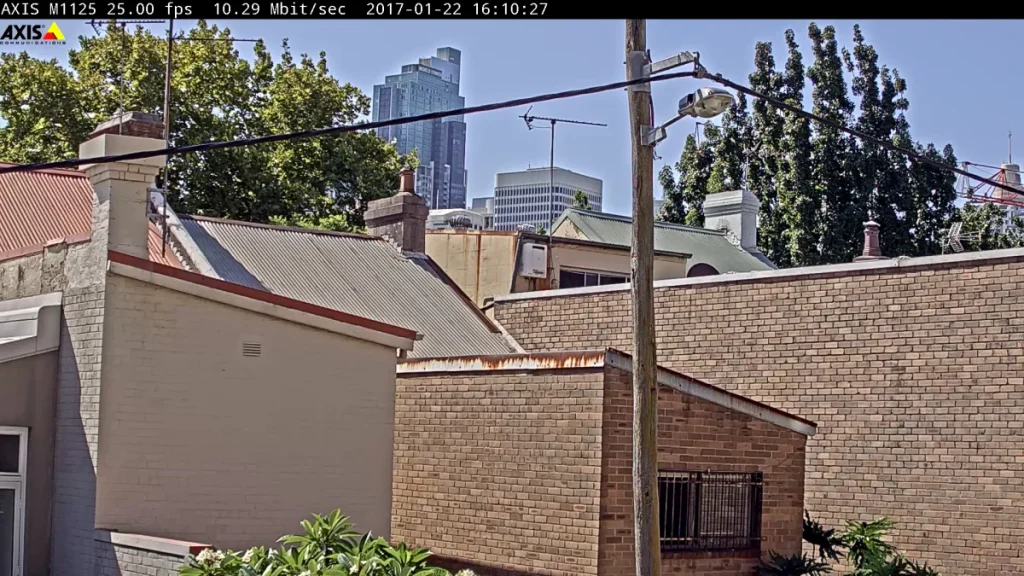
Last year we tested Uniview’s IPC542E-DUG Starlight full body day/night camera, distributed locally by C.R. Kennedy, with its kit Uniview-branded f1.4 3.8-11mm varifocal lens and while we like some aspects of its performance, we thought we’d take another look at this unit teamed up with Fujinon F1.6 4.1-9mm Varifocal CCTV Lens. We’re also going to test this camera for motion blur.
Fujinon F1.6 4.1-9mm Varifocal CCTV Lens – Bright sparks will have noticed the sensor of the Uniview Starlight is 1/1.9th of an inch and the lens is 1/1.8th-inch – we will certainly keep an eye out for vignetting though according to Fujinon, this lens can be used with image sensors of 1/1.8, 1/2, 1/3 and 1/4 sizes, so it should be fine on the Starlight.
Uniview’s Starlight is a full body camera with a 1/1.9-inch progressive scan CMOS sensor that offers low light performance in colour claimed to be 0.002 lux (starlight on a clear night) and 0.0002 lux in monochrome. WDR is 120dB, signal-to-noise ratio is around 52dB, resolution is 1920 x 1080p at 30ips and there are H.264 and MJPEG video compression options.
When we tested Starlight with the kit lens we found longitudinal and lateral chromatic aberrations in high contrast areas, as well as experiencing some flare and ghosting in full sun and under direct streetlight at night. We also found colour tended be a little flat. At the same time, the Uniview Starlight impressed as an excellent low light performer. In addition, we suspected the Uniview had extremely low motion blur that we weren’t able to show to best advantage thanks to some blooming.
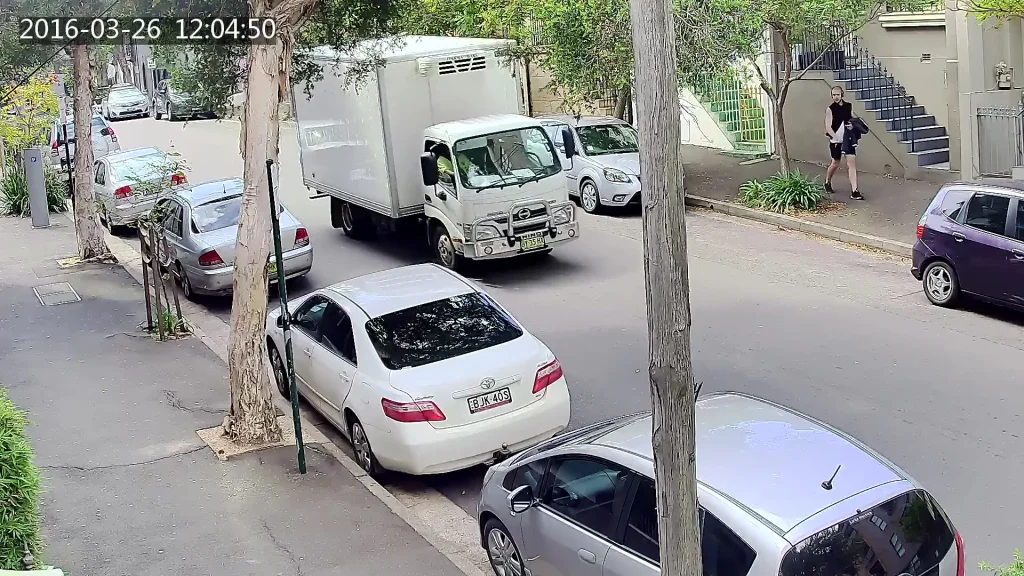
Swapping out the Uniview lens for this Fujinon takes about 3 seconds as I take a look at the images during setup, I get a good sense of lens performance. Colour rendition looks neutral, distortion looks low, I see fewer CAs around lights. Conducting my WDR test with Norman and around 80,000 lux of backlight and with WDR settings on Auto and the WDR slider at 9 I again see fewer CAs with this Fujinon lens. The image does look different in close-up, where the Uniview camera and Uniview lens combo are showing unusually strong contrast.
Fujinon F1.6 4.1-9mm Varifocal CCTV Lens – It’s the same looking at the wide view out the back – the Fujinon F1.6 4.1-9mm Varifocal CCTV Lens is handling flare and ghosting much better than the Uniview and the combination seems to do better against backlight. But again, the contrast of the Uniview lens looks stronger. In my original test, I ran the Uniview WDR at +1 on the slider part of the time and when I powered the camera back up it’s gone to a default of +9 when WDR is on Auto.
A WDR setting of +9 on this camera introduces some warm tones, while lower levels are cooler.
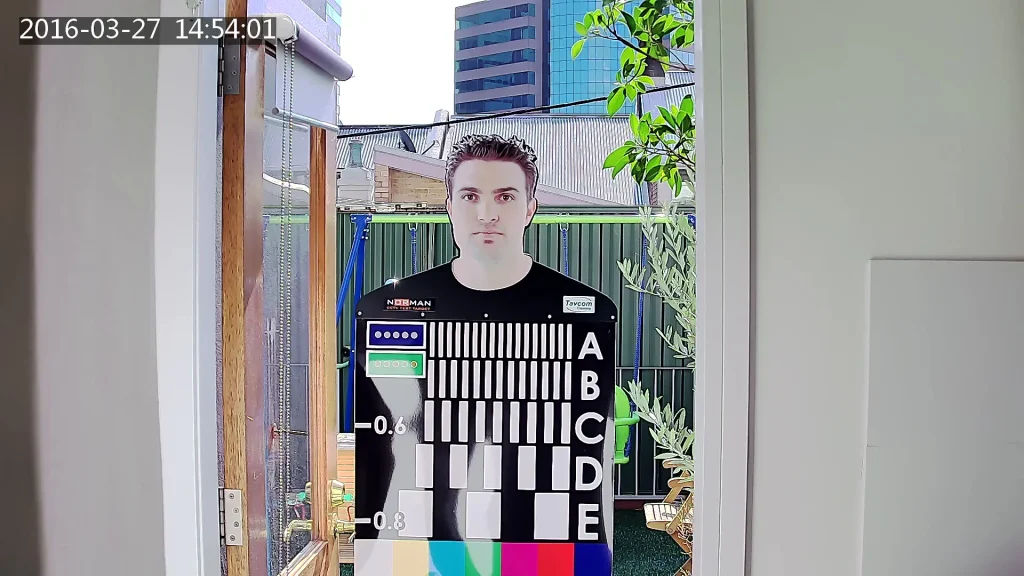
Looking at the images later on, I conclude the Fujinon is doing better with spherochromatism, colour rendition, particularly faces, and has less barrel distortion, while the Uniview lens assisted by a lower WDR setting is offering stronger contrast and seemingly, less digital rebuilding of the image. At the same time it shows stronger shadows in the foreground of backlight scenes. After working this out, I spend some time selecting WDR3 as my preferred setting and I stay there for the rest of the test.
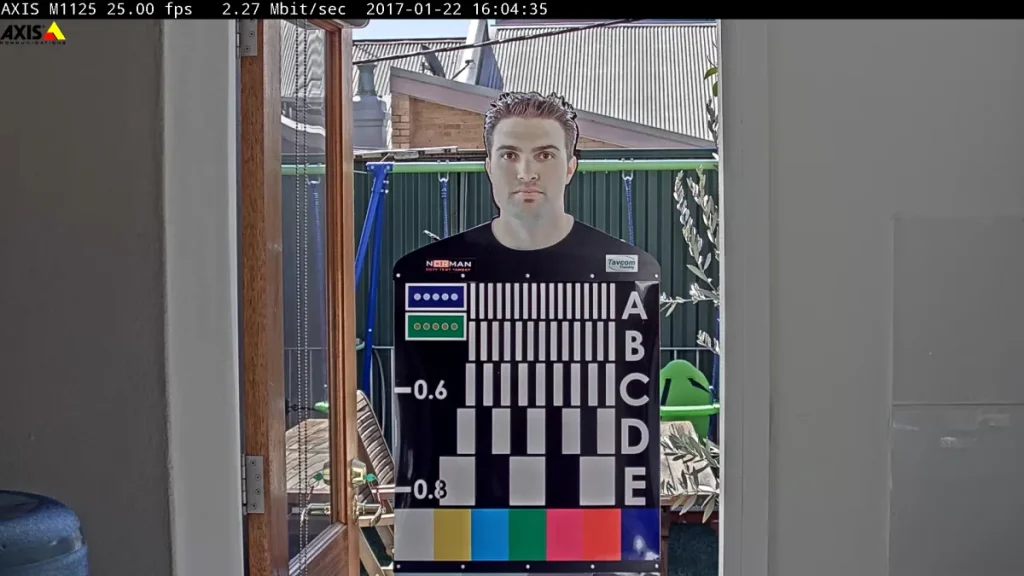
Fujinon F1.6 4.1-9mm Varifocal CCTV Lens-WDR test and Motion Blur
Now I’ve compared the 2 lenses for CAs in the presence of WDR I decide to have some fun with motion blur using an elevated mounting point over the street and a maximum focal length of 9mm. Motion blur is obviously a key consideration for many camera buyers. I get the camera set up and sit down in front of my workstation and take a snapshot of a passing car and take a look at image in my snapshot folder.
Yes, I can get plates – and at speeds of up to 40kmph. There’s a point at which the speed of the vehicle starts to overwhelm the camera’s processing speed but in good light, no dramas. In terms of focal point, there’s a sweet spot and it’s closer to the camera – between 9-12m in my estimation.
As light levels fall, in the late afternoon, the ability to snare number plates drops off and eventually I go into manual shutter settings to try to regain the capability. As the shutter speed increases the image gets a little darker but it’s incremental. The challenge of getting LPR even on manual shutter settings makes me think that typically IP cameras experience more processing latency in low light as they work harder to reconstruct the image using smaller signals.
Getting plates of moving vehicles in low light is tough for any IP CCTV camera. Faces are much easier to achieve.
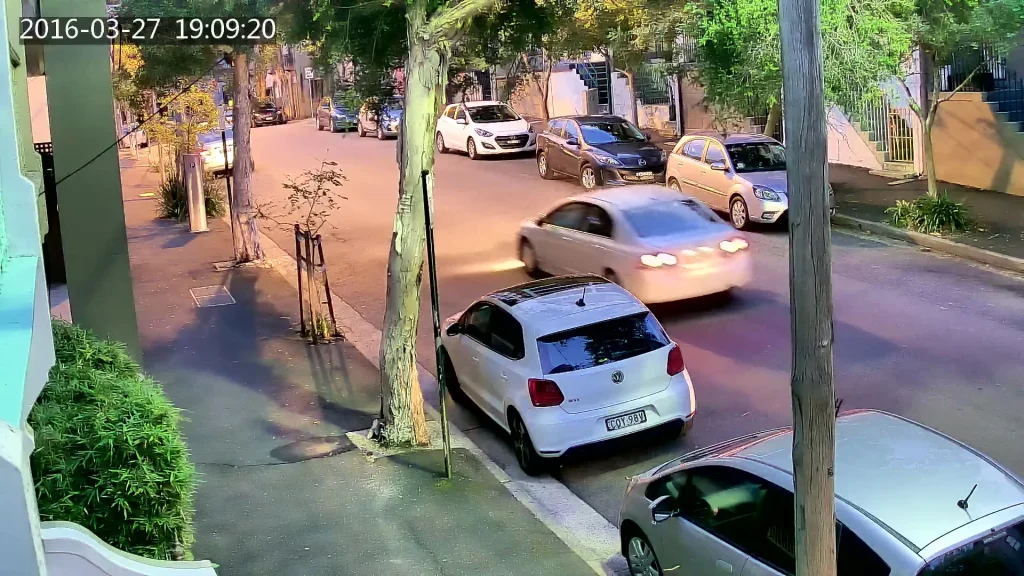
Something I do notice is the strength of this Uniview Starlight camera in low light. It’s very strong. Is it better with this Fujinon lens than it was with the kit lens? Yes, I think colours are more natural in low light, too. I’ve got the camera locked in colour at 7pm with sub 8-lux on the street and performance is great, with super depth of field. You get a brighter image with WDR at 9 but there’s more detail with WDR at 1, which is where I had it during my first test. The image is better but darker with WDR off or on Auto.
Inconclusion
Fujinon F1.6 4.1-9mm Varifocal CCTV Lens – Having considered the Fujinon F1.6 4.1-9mm Varifocal CCTV Lens on 2 different cameras, it’s fair to say this is a quality lens that enhances the performance of serious security cameras over and above that of most kit lenses. It’s worth pointing out here that the Bosch Starlight 8000 MP camera uses an OEM version of the Fujinon lens and is another standout performer in a range of backlit and low light conditions.
If there’s a weakness with Fujinon’s DV2, it’s the presence of mild but persistent chromatic aberrations in areas of high contrast at the widest angles of view. From about 5.5mm onwards, and especially from 7-9mm, performance of the Fujinon 4.1-9mm lens is outstanding. ♦
More SEN news here.
By John Adams
“Fujinon F1.6 4.1-9mm Varifocal CCTV Lens.”










